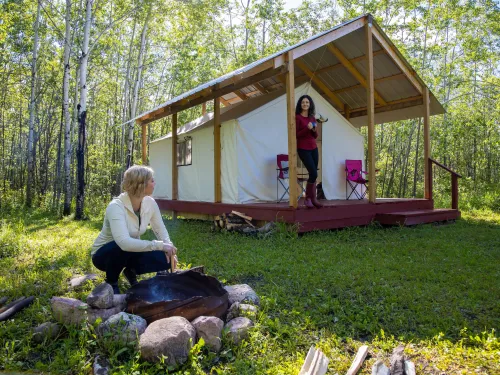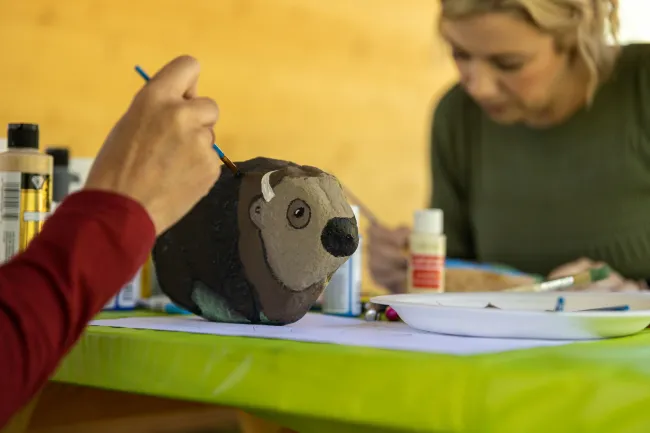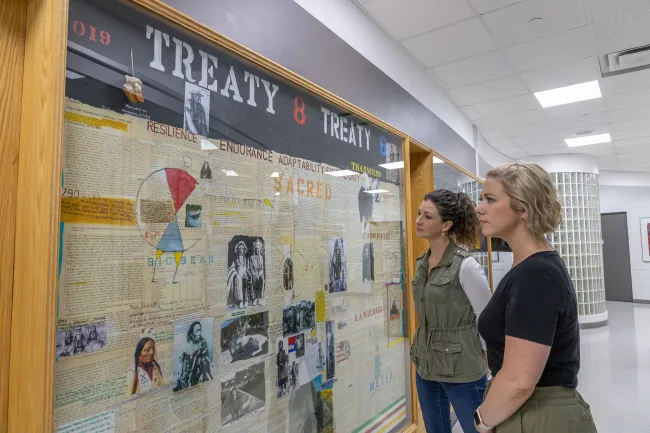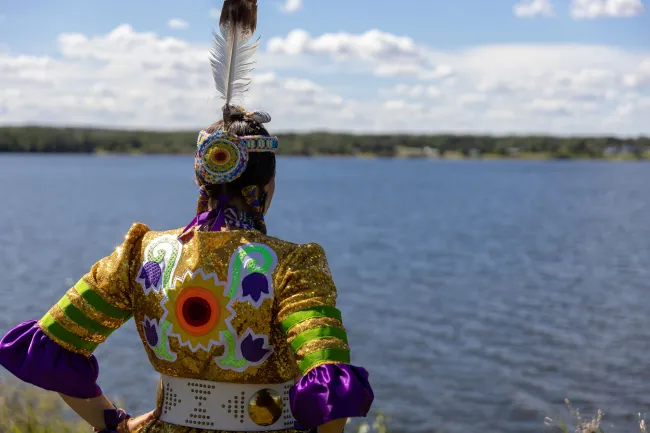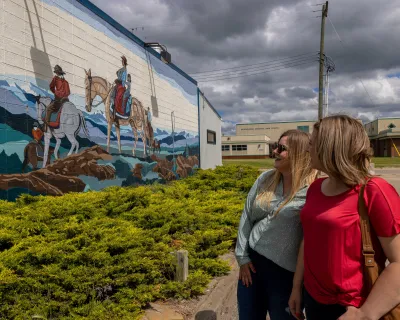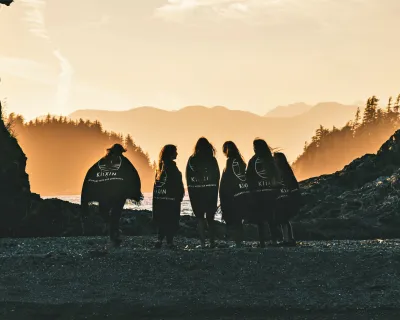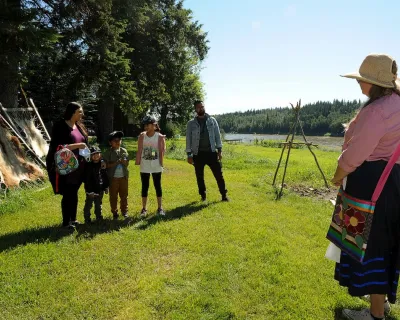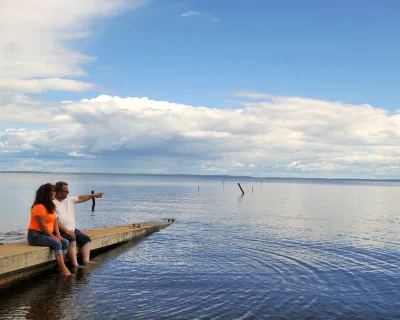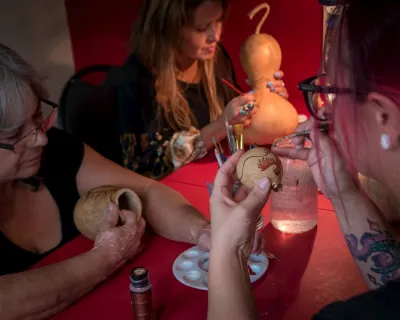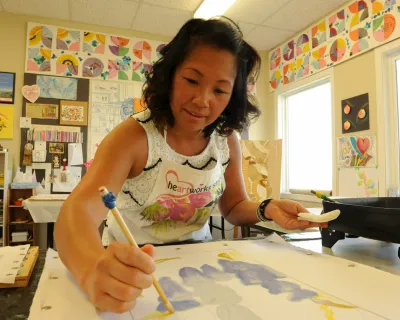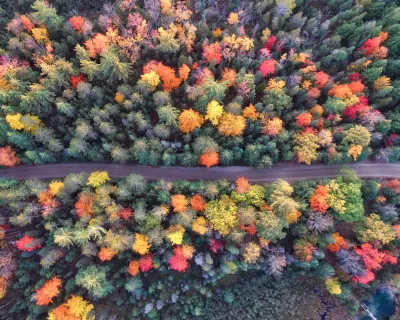Living Traditions in Lac La Biche Region
#TakeItToTheLake #NEAB
Alberta's northeast abounds with wide-open spaces, pristine lakes, boreal forests and captivating heritage experiences. Explore NEAB this summer!
Lac La Biche Region, AB - After camping overnight in a trapper’s tent at Hideaway Adventure Grounds, in Kikino Métis Settlement, Amy Stewart and Ali Cole emerge to a forest alive with wonder, and one underlying question that many Canadians subconsciously avoid: who does this land belong to and what is our place on it? Through our time here with John Ritchie, as he shares some of the wisdom of his Indigenous heritage, perhaps we’ll come closer to understanding.
We inhabit, we explore, we harvest and we walk upon this land as if we could own it, while all around us, creation watches. Ravens circle overhead, spying us beneath the canopy of glowing green aspen leaves. Buddy, John Ritchie’s great german shepherd cross, brushes against our legs and peers questioningly at us. The squirrels and songbirds watch from their perches as the sun warms the grass and the dew evaporates into the freshness of morning. What are these great, curious, noisy animals up to?
We come to nature when we feel lost, and we find home. For one night, home for these two friends is a trapper’s tent in the boreal forest. Their kitchen is outdoors, with a firepit to cook over and a wooden table to prepare breakfast. Coffee percolates in a ceramic blue urn that hangs over the fire on a tripod made from three large branches.
In the simplest sense, the property belongs to John Ritchie, who homesteaded here for many years before developing his wilderness campground and retreat on this spot. Ritchie himself belongs, in another sense, to the Métis people, and he shares teachings from his Indigenous background here at Hideaway Adventure Grounds.
His teachings originate from a common First Nations concept known as the Seven Traditional Teachings. The teachings are a way of finding balance in oneself, and in one’s community and surroundings. Each of the seven principles is summarized in a single word - love, respect, honesty, courage, humility, truth and wisdom - and symbolized by a different animal.
In selecting and decorating our own value rocks, our activity today is to go on a personal journey. Today, our job is to reconnect with all in creation that we have forgotten. Cole chooses as her theme the bison, symbolic of respect, while Stewart chooses the wolf, symbolizing humility.
Art has always been a part of Indigenous expression, but for many years it was suppressed in Canada, or not taken seriously. This led to the formation of the Professional Native Indian Artists Incorporated (PNIAI), often known colloquially as the Indigenous Group of Seven, in the 1970s.
A diverse collection of their work, and other influential and important Indigenous artists, is housed at Portage College in Lac La Biche, in the Museum of Aboriginal Peoples’ Art and Artifacts. It is the only permanent exhibit of the group’s work, and ranges from traditional representations to neon-infused modern takes on classic styles.
Visit Lac La Biche and learn more about the region's unique heritage.
Stewart and Cole stop, transfixed, in front of Dr. Jane Ash Poitras’ epic double-panelled masterwork, Preservation Reservation 2020. In it, images of residential schools, Indigenous traditions, copy from old archival documents and historic quotes mingle, allowing the viewer to enter where she will and learn what she can, and derive her own understanding.
The question here is not who owns this land, but perhaps, who owns this story and who has the right to tell it? And what must the listeners learn through its telling?
In the Lac La Biche Region mosaic of today, many other cultures are represented, among them French, Russian Orthodox and Lebanese. All contribute to the community in their own way and have their own sense of roots here going back several generations.
For Hoda Fyith, owner of The Cafe on Main, hospitality is ingrained in her Lebanese roots, and food is a way to welcome people. Laughter spills from the kitchen as she and her staff prepare their summer special feature, a traditional Lebanese meal infused with the rich, refreshing flavours of garlic, onion, lemon, parsley.
With their takeout from the cafe in hand, Cole and Stewart head for the lake to have a picnic. Here, we meet Randi Lynn Candline, a Jingle Dress dancer who graciously shares her dance with us. The Jingle Dance is a healing dance, she tells us, partly through the effect of the ringing metal cones on the dress. She recalls how she was surprised to discover that the ancient Tibetan tradition of the singing bowls is seen by that culture in much the same way.
Seeking that common thread is part of the work we all have to do. Listening to the jingling of the traditional dress, the teachings of ancient cultures and the voices of the people on this land might help us as we confront the uncomfortable questions ahead.
WHEN YOU GO
- Stop in at The Cafe on Main for their #TakeItToTheLake summer special featuring traditional Lebanese dishes - hummus, tabouleh, fatoush and kafta - and make a picnic of it. Their baklava is unmatched!
- A stay at Hideaway Adventure Grounds offers a true nature escape; book an activity to get the full, rounded experience and learn about Indigenous heritage.
- Portage College's Museum of Aboriginal Peoples' Art & Artifacts is open Mon - Fri, 9:00 a.m. - 3:30 p.m. Admission is free.
- Don’t miss a visit to Sir Winston Churchill Provincial Park - the only island provincial park in Alberta! It’s got beautiful beaches, old forest and (in season) pelicans.
For more travel ideas, visit the Lac La Biche Region website.
